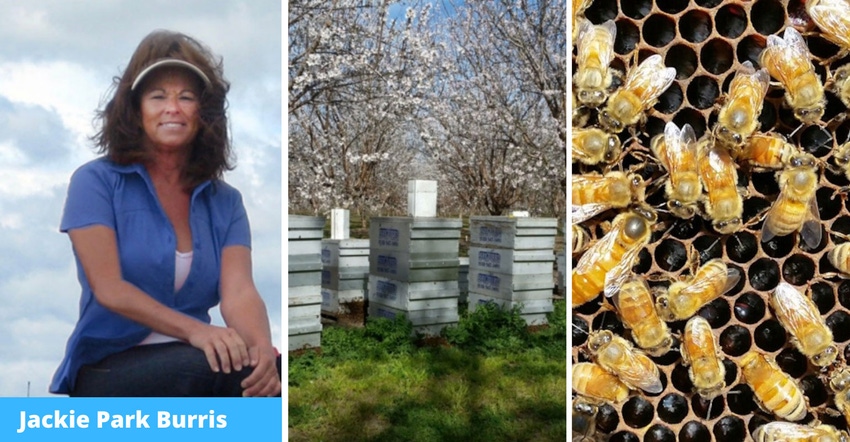March 17, 2021

Sponsored Content
Using her family’s pure Italian bees to pollinate almonds in her home state of California has never been something that Jackie Park-Burris has questioned.
“My family has always pollinated almonds,” she says. “There are five family businesses here and we’ve all always pollinated the almonds. We just all always do it.”
As the daughter-in-law of an almond grower myself, I know the importance that beekeepers play in almond pollination. In fact, nearly every beekeeping operation in the U.S. has joined in the almond pollination process now. The Park Family is no different, except that they have been part of that process for generations now.
Their bee tradition started long before Jackie was born with her uncle Homer, who found a fascination with bees the first time he caught a swarm in his horse’s gunny sack. Years later, Homer convinced his younger brother Jack to join him in raising queens for export. Jackie worked the business with her dad until his death when she took the reins herself and established Jackie Park-Burris Queens, Inc. She stayed with the family’s chosen breed, the Italian bee.
“Each breed has its highlights and its drawbacks,” she says. “I chose to stay with the Italians that my family had always had.”
Since it is Women’s History Month, I asked Jackie about finding herself running an agriculture business as a young woman. She says she’s been one of just a few her whole career. In fact, she was the first female President of the California Bee Breeders Association and the first female Chairman of the California State Apiary Board.
“It was a little concerning at first, but the thing that saved me was that I had always worked for my father,” she says. “When I went to an orchard, they already knew me, and they had seen me work.”
“Plus, I want to always be out in the field working the bees. You earn respect when you are out in the field doing what they are doing.”
As almond pollination prices continue to increase, Jackie says her advice to growers is to concentrate more on your relationship with your beekeeper than the price.
“The relationship between the grower and the beekeeper is huge,” she says. “I have a strong relationship with the group of growers that I work with and they trust that I’m going to do the very best I can to bring him the strongest hive I can.”
“If you work only on the price of the hives, you’re not doing yourself a justice,” she says. “You need to work with a beekeeper who knows your orchard, shows up on time, respects your orchard and gets the bees in when you want and out when you want.”
“That evolves over years of understanding the orchards and growers.”
The evolution of a grower/beekeeper relationship is something that Jackie says she’s seen firsthand. Some of the growers she works with now have been with her family even longer than Jackie has been in it.
When almond pollination season is over, Jackie and her son, who has joined the business as the third Park generation, will concentrate on breeding queen bees for sale throughout the United States.
Jackie told me that it was easy for her to work hard at managing her beekeeping and breeding business, keeping a healthy relationship with her growers and caring for her more than 3,000 bee colonies.
“I really love what I do,” she says.
One of the best things about Certis’ broad portfolios of pest solutions are the many low risk products to bees and other beneficial organisms compared to conventional chemical insecticides and fungicides. Many of our other products carry the same level of specificity to their active ingredients, making them lower risk to beneficial species.
To help protect bees and other beneficial species across California, remember to read the label instructions and follow any restrictions carefully when you are using agriculture input products.
Also, as pollination is underway and you are preparing for bloom, the Certis California team is ready to help you make the most of your applications, pest management and IPM program. If you have any questions for us, please reach out at [email protected]. We are ready to be part of your successful 2021 growing season.
You May Also Like




